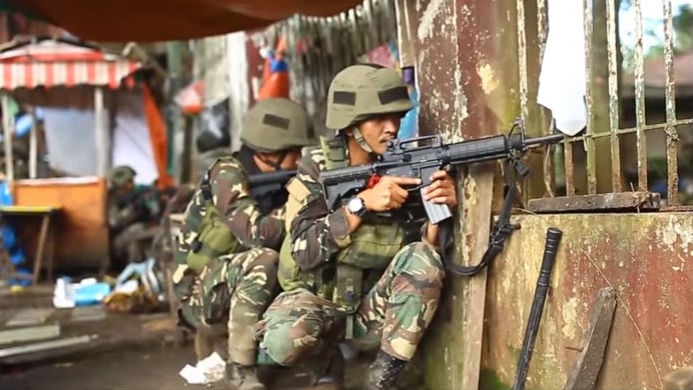Philippines Terror Attack Threatens ASEAN Maritime Security

The unprecedented attack of the ISIS-backed militant group Maute Group in Marawi City in Mindanao, the Philippines, could mark the beginning of a new threat to Southeast Asian maritime security.
The Maute group, also known as the Islamic State of Lanao, is a radical Islamist group composed of former Moro Islamic Liberation Front guerrillas and some foreign fighters led by Abdullah Maute, the alleged founder of a Dawlah Islamiya, or Islamic State based in Lanao del Sur, Mindanao, Philippines.
The Marawi conflict started last week when a group of soldiers and police authorities served a court’s arrest warrant to Abu Sayyaf Leader Isnilon Hapilon who was spotted in Marawi. Military intelligence reported that Isnilon’s Abu Sayyaf group joined the Maute group as a strategy to expand both networks.
Upon learning of the police and military presence serving the warrant, the militants immediately fired shots at the arresting authorities, sparking a firefight in the city.
During the fight, the military authorities discovered that the Maute Group had been joined by Ansarul Khilafah Philippines, Bangsamoro Islamic Freedom Fighters and the Abu Sayyaf Group, known for its maritime piracy in Philippine and Malaysian waters.
Philippine Solicitor–General Jose Calida has publicly announced that “what is happening in Mindanao is no longer a rebellion of citizens, it has transmogrified into an invasion of foreign terrorists who heeded the clarion call of ISIS.”
Moreover, a Singapore media outlet has reported that yet another group, Jemaah Islamiyah, has set up a training center in the Southern Philippines which is expected to groom Indonesians, Malaysians, Singaporeans, Thai Muslims and Arabs. The Al-Qaeda-supported training center has become a connecting link between Philippines and Malaysia sea border that could pose a security threat to commercial shipping lines passing through the Philippine-Malaysian waters.
The ISIS-backed Maute terror group is expanding its network presence in the ASEAN region and might move into maritime operations, just as the Abu Sayyaf group has already done. By showing their armed strength in Marawi, the four ISIS-inspired groups could grow in strength and numbers, posing an unpredictable challenge not only on ASEAN battle grounds but also in its maritime arena where they are expected to engage in maritime piracy and kidnap for ransom activities to raise funds for their extremist movement.
Given these unpredictable maritime threats, maritime officials from the Philippines, Malaysia and Indonesia have been meeting frequently to discuss how to protect commercial shipping passing through their respective borders. However, the Abu Sayyaf group, which has links with the Maute group, have continued operations. The group abducted a captain and chief engineer in March this year when their vessel was cruising the Southern Mindanao – General Santos City route; evidence that trans-border crimes, terrorism and piracy have continued in the Sulu-Sulawesi-Celebes Sea.
Despite the regional terrorism, the Southern Philippine maritime economy is still becoming an emerging gateway for new shipping routes. Last month, the Philippine and Indonesia created a new shipping route that will connect two cities in the Philippines (Davao and General Santos cities) and the North Sulawesi Province in Indonesia.
Meanwhile, military leaders of the 10 ASEAN member nations met in Manila to protect the ASEAN maritime. Armed Forces Chief of Staff General Eduardo Ano said during the meeting that “ASEAN has become a rising global economic force due to its strategic location and economic activity. It has abundant resources, a more integrated market, and a large combined GDP from its members.”
ASEAN which has a population of 622 million is Asia’s third largest economy behind China and India and has a combined $2.6 trillion GDP.
As international shipping increases in ASEAN waters, the ASEAN governments will need to be prepared to address the rising threat of terror and piracy in the region.
The opinions expressed herein are the author's and not necessarily those of The Maritime Executive.
